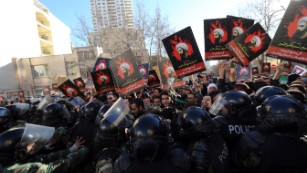Iran-Saudi tensions: 6 nations label embassy attack terrorism
A six-nation Middle Eastern alliance agreed Saturday to characterize the recent attack on Saudi Arabia's embassy in Tehran as an act of terror -- strong language that marks an even further escalation in a tiff that has embroiled the region for days.
Foreign ministers from the six Gulf Cooperation Council met in the Saudi Arabian capital of Riyadh, after which alliance Secretary-General Abdul Latif Zayani read a statement indicating that the nations agreed to label last weekend's incident as terrorism.
Zayani himself a few days ago referred to the Saudi Embassy as a terrorist act, so this terminology isn't entirely new. Still, it is significant in that the six GCC countries -- Bahrain, Kuwait, Oman, Qatar, Saudi Arabia and the United Arab Emirates -- are now officially on the same page.
It also suggests countries in the region aren't acceding to requests from the United Nations, United States and other officials to tone down their rhetoric and refocus on other issues, like peacefully ending Syria's civil war and dealing with ISIS.
Iranian President: Anger over executions 'only natural'
Protesters stormed and set ablaze the embassy in Tehran starting last Saturday, hours after Saudi Arabia executed 47 people, including prominent Shiite cleric Sheikh Nimr al-Nimr, on terrorism charges.
That attack spurred Saudi Arabia to sever official ties with Iran, its longtime regional rival. Several other countries -- most of them led by and/or containing mostly Sunni Muslims, like Saudi Arabia, as opposed to Shiite-led Iran -- joined in. In that respect, this spat continues the schism that happened 14 centuries ago when Sunnis and Shiites split over who should succeed the Prophet Mohammed as Islam's leader.
Saudi execution threatens to deepen Shia-Sunni divide
Iran, though, has stood its ground -- even banning pilgrimages to Mecca and Medina as well as Saudi imports. President Hassan Rouhani called the angry reaction to Nimr's killing "only natural" and slammed Saudi Arabia for severing ties in response.
"Of course, the Saudi government, in order to cover up its crime of beheading a religious leader, has resorted to a strange measure and has severed its ties with the Islamic Republic," Rouhani said, according to Iran's state-run Press TV. "Undoubtedly, such moves will never hide that great crime."
Iran and Saudi Arabia at loggerheads: How we got here
Ministers accuse Iran of 'direct incitements'
The Gulf ministers who met Saturday in Riyadh, though, together insisted that Iran is in the wrong -- not just because of the embassy attacks specifically, but due to its actions and comments criticizing the Saudi executions.
According to the official Saudi Press Agency, the GCC ministers condemned not only the embassy attack but what it called "the Iranian blatant interventions in the internal affairs of the Kingdom of Saudi Arabia."
That report called "Iranian hostile and provocative statement on the judicial rulings implements (in Saudi Arabia) against a number of terrorists" as "direct incitements for launching attacks on the diplomatic missions."
The same council also raised other gripes against Tehran, like its "continued occupation of ... three United Arab Emirates islands, ... spread of sectarian strife, support for terrorist organizations and incitement to undermine security and stability in GCC countries."
The SPA report concluded, "The GCC Ministerial Council urged the international community to take necessary measures to compel Iran to respect the principle of good neighborliness, to stop its activities destabilizing the region, to stop its support for terrorism, to not interfere in the internal affairs of the GCC countries and the region's countries, and to not use or threaten to use force."
News Courtesy: www.cnn.com












